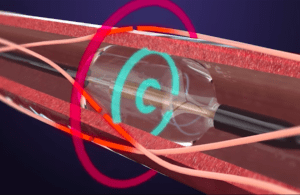
ReCor Medical announced today that its Paradise ultrasound renal denervation (uRDN) system successfully reduced blood pressure in a study.
Palo Alto, California-based ReCor published primary endpoint results from its Radiance II trial in the Journal of the American Medical Association (JAMA). Results showed success for Paradise in reducing blood pressure compared to sham. Additionally, pooled analysis from multiple studies showed consistent blood pressure lowering. This took effect across a range of hypertension, including mild to moderate and resistant hypertension.
“The results of the Radiance clinical trials are meaningful in that they solidify the role of the Paradise uRDN System as an adjunctive therapy for hypertension treatment, in addition to medications and lifestyle modification. Having three consistent sham-controlled clinical trials demonstrating that the Paradise uRDN System can safely lower blood pressure across a range of patients is a very high bar to have met,” said study principal investigator Dr. Ajay Kirtane.
Kirtane serves as a professor of medicine at Columbia University, Vagelos College of Physicians and Surgeons and New York-Presbyterian Hospital.
ReCor reports Radiance II results
Radiance II is a randomized, sham-controlled FDA investigational device exemption (IDE) trial for Paradise uRDN. ReCor presented results showing that the system met primary efficacy endpoints at TCT 2022 in September. They followed the company’s July announcement that Paradise met its primary endpoints in the same trial.
The study took place across 60 centers in eight countries, evaluating 224 patients with uncontrolled hypertension. These patients, randomized 2:1 to uRDN or sham, remained off antihypertensive medications throughout two months of follow-up.
At the two-month primary efficacy endpoint, Paradise patients showed a mean reduction in daytime ambulatory systolic blood pressure of -7.9 mmHg. That compared to a -1.8 mmHg reduction in the sham arm. The study also met its primary safety composite outcome with no major adverse events observed.
Additional study data from the pooled analysis
Concurrently published in JAMA Cardiology, the Radiance pooled analysis includes data from more than 500 patients in three studies. The Radiance Global Program (Radiance-HTN TRIO) studied patients with resistant hypertension. ReCor’s Radiance-HTN SOLO and Radiance II studied patients with mild-moderate hypertension.
The combination dataset showed an overall reduction in daytime ambulatory systolic BP in the uRDN group of -8.5 mmHg. That bettered the sham group at two months by -5.9 mmHg. Blood pressure results came in similarly positive in 24-hour, nighttime, home and office measures. ReCor said it observed a favorable safety profile across all three studies.
“With hypertension being a leading cause of cardiovascular disease worldwide, it is vital that we help patients with an effective therapy to reduce blood pressure. We are pleased that the Radiance clinical trials have repeatedly shown that the Paradise uRDN System can successfully reduce blood pressure in a broad range of patients,” said ReCor President and CEO Lara Barghout. “ReCor is focused on bringing the Paradise uRDN System to patients and their physicians as a treatment option in the near future.”